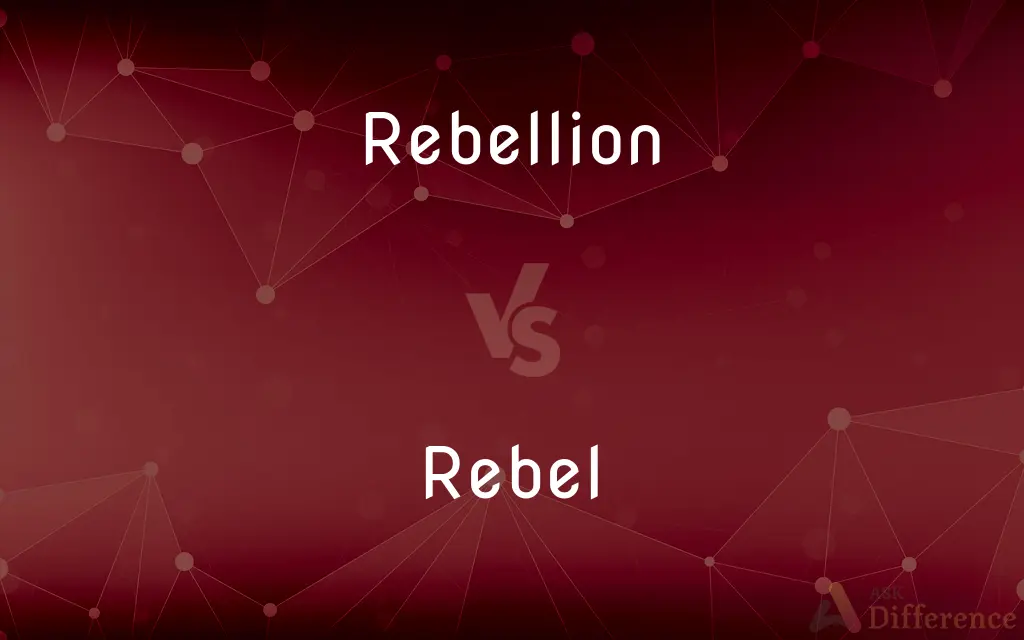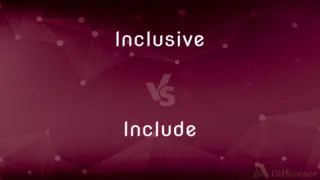Rebellion vs. Rebel — What's the Difference?
By Urooj Arif & Fiza Rafique — Updated on April 26, 2024
Rebellion refers to an act of armed resistance or defiance against an established authority or government, typically involving collective action; a rebel is an individual who participates in such resistance.

Difference Between Rebellion and Rebel
Table of Contents
ADVERTISEMENT
Key Differences
A rebellion is a collective uprising or movement against authority or government, often aiming to overthrow or cause significant change. Whereas, a rebel is a person who actively participates in this uprising, opposing or resisting authority through direct action.
Rebellion can occur in various forms such as political coups, revolutions, or civil disobedience, characterized by organized actions and a shared goal among participants. On the other hand, rebels can be individuals with diverse motivations, ranging from ideological to personal grievances.
The term rebellion usually implies a wider scale of conflict or dissent, potentially impacting the socio-political landscape of a region or country. Conversely, rebels might operate within smaller groups or even act independently, contributing to the larger cause in various capacities.
Historical and contemporary contexts show that rebellions are driven by widespread discontent with systemic issues or oppressive regimes. Rebels, however, are often seen as heroes or villains depending on one's perspective, embodying the spirit and aims of the larger rebellion.
In literature and culture, rebellion is often romanticized as a noble struggle for justice and rights, while rebels are depicted as courageous figures challenging the status quo or tyrannical powers.
ADVERTISEMENT
Comparison Chart
Definition
An act of armed resistance against authority
An individual who participates in a rebellion
Scale
Collective, involving groups or large populations
Individual participation
Motivation
Often political, aiming for systemic change
Can vary from personal to ideological
Perception
Seen as a political or social movement
Viewed as a hero or villain based on perspective
Examples
American Revolution, French Revolution
Che Guevara, Joan of Arc
Compare with Definitions
Rebellion
A widespread uprising among a group of people.
The peasant rebellion was sparked by oppressive taxation.
Rebel
One who rejects societal norms or practices.
As a rebel, he always chose paths less traveled.
Rebellion
A defiance of conventional behavior or practice.
Her artistic rebellion broke all the traditional molds.
Rebel
A person who resists authority or control.
The young rebel became a symbol of resistance in her community.
Rebellion
An organized attempt to overthrow a government or authority.
The rebellion aimed to establish a new democratic government.
Rebel
Someone who stands up against the status quo.
She was a rebel in her field, introducing radical new theories.
Rebellion
A movement seeking major change or correction of grievances.
The rebellion sought to address longstanding injustices.
Rebel
Often used to describe a non-conformist in culture or art.
The artist was known as a rebel, constantly defying artistic conventions.
Rebellion
A refusal to obey rules or accept norms.
The teenager's constant rebellion against school authority worried his parents.
Rebel
A participant in a rebellion.
The rebels took control of the capital city last night.
Rebellion
Organized opposition to authority; a conflict in which one faction tries to wrest control from another
Rebel
A person who rises in opposition or armed resistance against an established government or leader
Tory rebels
Rebel forces
Rebellion
Rebellion, uprising, or insurrection is a refusal of obedience or order. It refers to the open resistance against the orders of an established authority.A rebellion originates from a sentiment of indignation and disapproval of a situation and then manifests itself by the refusal to submit or to obey the authority responsible for this situation.
Rebel
Rise in opposition or armed resistance to an established government or leader
The Earl of Pembroke subsequently rebelled against Henry III
Rebellion
An act of armed resistance to an established government or leader
The authorities put down a rebellion by landless colonials
The Bretons rose in rebellion against the King
Rebel
To refuse allegiance to and oppose by force an established government or ruling authority.
Rebellion
Open, armed, and organized resistance to a constituted government.
Rebel
To resist or defy an authority or a generally accepted convention.
Rebellion
An instance of this.
Rebel
To feel or express strong unwillingness or repugnance
She rebelled at the unwelcome suggestion.
Rebellion
Defiance toward an authority or established convention
An act of adolescent rebellion.
Rebel
One who rebels or is in rebellion.
Rebellion
An instance of this.
Rebel
Rebel A Confederate soldier.
Rebellion
(uncountable) Armed resistance to an established government or ruler.
The government is doing its best to stop rebellion in the country.
Rebel
A person who resists or defies authority or convention
"In her own mind, Jan is ... a rebel, an iconoclast, a strange and estranged and angry freedom fighter" (Perri Klass).
Rebellion
(countable) Defiance of authority or control; the act of rebelling.
Having a tattoo was Mathilda's personal rebellion against her parents.
Rebel
A person who resists an established authority, often violently.
A group of rebels defied the general's orders and split off from the main army.
My little sister is such a rebel - coming home late, piercing her ears, and refusing to do any of her chores.
Rebellion
(countable) An organized, forceful subversion of the law of the land in an attempt to replace it with another form of government.
The army general led a successful rebellion and became president of the country.
Rebel
Synonym of Confederate: a citizen of the Confederate States of America, especially a Confederate soldier.
Rebellion
The act of rebelling; open and avowed renunciation of the authority of the government to which one owes obedience, and resistance to its officers and laws, either by levying war, or by aiding others to do so; an organized uprising of subjects for the purpose of coercing or overthrowing their lawful ruler or government by force; revolt; insurrection.
No sooner is the standard of rebellion displayed than men of desperate principles resort to it.
Rebel
(intransitive) To resist or become defiant toward an authority.
To rebel against the system
Rebellion
Open resistance to, or defiance of, lawful authority.
Rebel
Pertaining to rebels or rebellion; acting in revolt; rebellious; as, rebel troops.
Whoso be rebel to my judgment.
Convict by flight, and rebel to all law.
Rebellion
Refusal to accept some authority or code or convention;
Each generation must have its own rebellion
His body was in rebellion against fatigue
Rebel
One who rebels.
Rebel
To renounce, and resist by force, the authority of the ruler or government to which one owes obedience. See Rebellion.
The murmur and the churls' rebelling.
Ye have builded you an altar, that ye might rebel this day against the Lord.
Rebel
To be disobedient to authority; to assume a hostile or insubordinate attitude; to revolt.
How could my hand rebel against my heart?How could your heart rebel against your reason?
Rebel
`johnny' was applied as a nickname for Confederate soldiers by the Federal soldiers in the American Civil War; `grayback' derived from their gray Confederate uniforms
Rebel
A person who takes part in an armed rebellion against the constituted authority (especially in the hope of improving conditions)
Rebel
Someone who exhibits great independence in thought and action
Rebel
Take part in a rebellion; renounce a former allegiance
Rebel
Break with established customs
Rebel
Used by northerners of Confederate soldiers;
The rebel yell
Rebel
Participating in organized resistance to a constituted government;
The rebelling confederacy
Common Curiosities
How do rebels impact society?
Rebels can drive change, influence societal norms, and sometimes alter the course of history.
Is every rebellion violent?
Not all rebellions are violent; some involve non-violent resistance or civil disobedience.
What causes a rebellion?
Rebellions are usually caused by widespread dissatisfaction with government policies, oppression, or injustice.
What is the difference between a rebel and a revolutionary?
A revolutionary is specifically focused on radical, systemic change, often through overthrowing a government, while a rebel might resist authority in various forms.
Can rebellions be successful without violence?
Yes, some successful rebellions, like the Velvet Revolution, have achieved their goals through peaceful means.
What are common traits of a rebel?
Common traits include courage, a strong sense of justice, and a disdain for conformity.
What role do rebels play in a rebellion?
Rebels are the active participants who carry out the objectives of a rebellion, often risking their lives.
Can a rebel act alone?
Yes, a rebel can act alone, although they are often part of a larger group.
Are rebels always fighting against a government?
While many rebels fight against governmental authorities, others may resist any form of control or oppressive system.
How do governments typically respond to rebellions?
Governments may respond with negotiation, reform, or suppression, depending on the nature and scale of the rebellion.
Do rebels always seek to overthrow a government?
Not always; some rebels may seek to change specific laws, policies, or social practices without overthrowing a government.
What are historical examples of successful rebellions?
Examples include the American Revolution and the Indian Independence Movement.
How do motivations of rebels vary?
Motivations can range from personal grievances to broad ideological beliefs about society and governance.
How are rebellions depicted in popular culture?
In popular culture, rebellions are often romanticized as heroic struggles for freedom and justice.
Is being a rebel generally viewed positively or negatively?
This depends on the context and the prevailing societal values; rebels can be viewed either as freedom fighters or as troublemakers.
Share Your Discovery

Previous Comparison
Ascribe vs. Attribute
Next Comparison
Inclusive vs. IncludeAuthor Spotlight
Written by
Urooj ArifUrooj is a skilled content writer at Ask Difference, known for her exceptional ability to simplify complex topics into engaging and informative content. With a passion for research and a flair for clear, concise writing, she consistently delivers articles that resonate with our diverse audience.
Co-written by
Fiza RafiqueFiza Rafique is a skilled content writer at AskDifference.com, where she meticulously refines and enhances written pieces. Drawing from her vast editorial expertise, Fiza ensures clarity, accuracy, and precision in every article. Passionate about language, she continually seeks to elevate the quality of content for readers worldwide.
















































